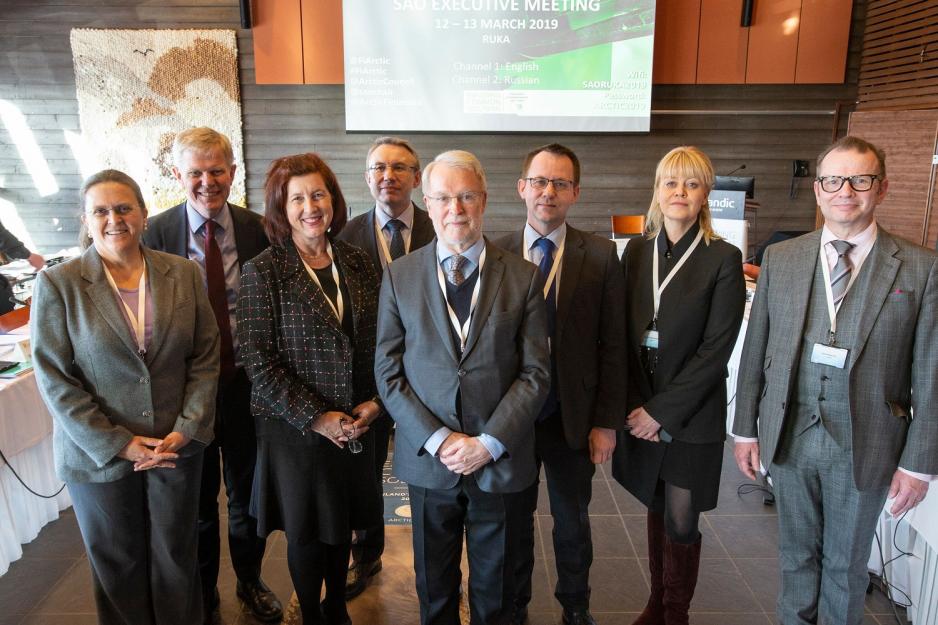Senior Officials of the Arctic Council Summed up the Results of Work for the Upcoming Ministerial Meeting

Two-day plenary meeting of the Senior Officials Committee of the Arctic Council was held on 12–14 March in Ruka, Finland. Photo provided by Kaisa Sirén
Two-day plenary meeting of the Senior Officials Committee of the Arctic Council was held on 12–14 March in Ruka, Finland. It was the last plenary meeting held during the Chairmanship of Finland in 2017–2019.
In the course of the meeting, the Senior Arctic Officials reviewed the results of two years of the Arctic Council’s work and approved many deliverables, which will be presented to the Ministers of Foreign Affairs of the Arctic countries at a meeting in Rovaniemi, Finland, on 6–7 May 2019. Iceland will assume the Chairmanship of the Arctic Council at the Ministerial meeting.
“Countries of the Arctic work together and, as proven by experience, this provides a serious effect for the Arctic as a whole,” Anton Kobyakov, Adviser to the President of the Russian Federation, commented the Arctic Council’s work. “Over the past two years, many international projects have been implemented, and Russia keenly participates in the most efficient ones. Work in the international format will be continued at the ‘Arctic: Territory of Dialogue’ 5th International Arctic Forum, which will be held on 9–10 April in St. Petersburg.”
The strategic plan, the Arctic Council’s first document of this kind, was largely approved in Ruka; the plan will consolidate the long-term priorities and key areas for development of the organization. Several documents for the upcoming Ministerial session in May were approved as well, suggesting collective efforts to address pressing issues for the Arctic region, including reduce of black soot and methane emissions.
Besides that, the Senior Arctic Officials reviewed the work of the Council’s financial mechanism – the Project support instrument – which promotes the implementation of practical actions necessary for the sustainable development of the Arctic. Among them are projects on utilization of solid domestic waste, reduction and complete abandonment of associated petroleum gas (APG) flaring, and “green shipping”.
“We hope that, together with our colleagues in the Arctic Council, we can continue with our substantive discussion on the development of the Arctic region in a larger format in a month from now in St. Petersburg at the ‘Arctic: Territory of Dialogue’ 5th International Arctic Forum. We see this Forum, which has drawn great interest from abroad, as a contribution to our common efforts to form an international partnership for the sustainable development of the Far North and its people. Results of discussions, conclusions, suggestions and recommendations will definitely be taken into account in the programme of the upcoming Russian Chairmanship of the Arctic Council in 2021–2023,” said Nikolai Korchunov, head of the Russian delegation, Ambassador for Special Assignments of the Russian Foreign Ministry.
The Arctic Council is a key intergovernmental organization that promotes international cooperation in the Arctic to ensure the sustainable development of the region, protect the environment and preserve the culture, traditions and languages of the indigenous peoples of the Far North. In addition to eight Member countries (Russia, Denmark, Iceland, Canada, Norway, USA, Finland and Sweden), six indigenous organizations take part in its work on a permanent basis (Inuit Circumpolar Conference, Aleutian International Association, Saami Council, Russian Association of Indigenous Peoples of the North, Siberia and Far East, Arctic Athabaskan Council and Gwich’in Council International), as well as representatives of countries and international organizations with Observer status.
Territory of Dialogue’ 5th International Arctic Forum
The ‘Arctic: Territory of Dialogue’ International Arctic Forum is one of the key platforms for the discussion, at a global level, of problems and prospects for the Arctic region.
The Forum is an opportunity for members of the international community to pool their efforts to ensure the efficient development of the Arctic and higher living standards for populations living in Arctic territories.
The ‘Arctic: Territory of Dialogue’ Forum was first held in 2010 and was devoted to contemporary problems of the Arctic region.
The second forum was held in 2011 and focused on issues of developing transport systems in the Arctic.
In 2013 the key themes considered included environmental protection, while in 2017 the Forum’s theme was ‘People and the Arctic’.
The key theme of the forthcoming 5th International Arctic Forum will be ‘The Arctic: An Ocean of Opportunity’.
Three pillars will form the basis of the business programme: ‘Coastal Regions’, ‘The Open Ocean’, and ‘Sustainable Development’.

